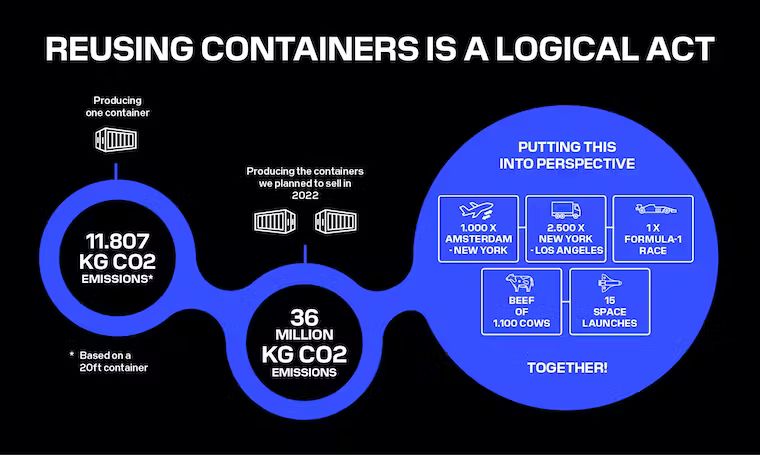SPRING SALE: Receive $100 Off Per Container
Reuse & Reduce
Eveon changes business model to improve sustainability in the container business.


- Producing a 20-foot container releases about as many CO₂-equivalents (CO₂e) as trucking the container 15 times from Memphis to Chicago.
- 13 to 18 percent of the world's 45 million containers are not used for shipping but, among other things, for storage: a purpose that is generally served just as well by a used shipping container.
- Eveon is the first provider to offer used shipping containers only, thereby reducing the CO₂ footprint across the entire container industry
Rotterdam, March 30, 2022 – The digital provider of shipping containers, Eveon Containers, today announces that it will only source and sell used shipping containers from now on. As part of its sustainability strategy, the Dutch startup will be the first container provider globally to refrain from selling new containers for climate protection reasons.
Since its founding in 2020, minimizing transport-related emissions has been an important concern for the startup. Eveon identified the production of containers as another adjusting screw in minimizing emissions. The realignment of Eveon's business model extends the life of containers after their average useful life of 10 to 15 years at sea. This avoids additional emissions from newly produced containers.
“The production of the containers we were planning to sell in 2022 would have emitted over 36 million kilograms of CO₂-equivalents,” explains Tim Simons, responsible for sustainable development at Eveon. “That's equivalent to the sum of 1,000 round-trip flights between Amsterdam and New York plus trucking 2,500 empty 40-foot containers from New York to Los Angeles plus organizing a Formula 1 race plus eating the beef of 1,100 cows along with 15 space launches.”*
Great market potential for used containers
Currently, around three to six million new shipping containers are produced globally every year. About 13 to 18 percent of these are not used for shipping, but mainly for land-based storage needs. Contrary to the purported demand for new containers, these mainland storage needs can usually be fulfilled just as well with a used shipping container versus needing a new one.
“Today alone, there are 45 million shipping containers in the global container fleet of shipping companies, which will at some point be available for a second life on land in the future. We decided to focus on working with owners of container fleets to repair and sell these containers in the area where they become available and avoid the empty repositioning of these containers. We consider it our mission to make the best use possible of all available resources. Reusing all existing containers and reducing CO₂ emissions is the logical consequence,” says Aad Storm, CEO and founder of Eveon, explaining his decision.
A pioneer in digitalization and sustainability
In addition, Eveon has focused on digitization and transparency in terms of the shopping experience from the very beginning. This is a novelty in the largely opaque container market, as product prices are traditionally not visible or have to be requested. “There is still considerable potential for sustainability and digitization in the industry. With our realignment, we are responding to the growing demand for modern, future-proof concepts,” Storm sums up.
About Eveon
Eveon is the leading sustainable e-commerce provider for the commercial procurement of used ISO-certified shipping containers. As the only digital provider in Germany, Eveon makes it possible to buy containers directly in the online shop with a fast and automatic delivery process. The digital, automated shopping experience makes the market more accessible to end customers and offers them fast service and lower prices. Sustainability is a key concern for Eveon, which is why the company has been offering only used ISO-certified containers since 2022, thus minimizing climate-damaging emissions. Eveon was founded in 2020 by Aad Storm in Rotterdam, Netherlands, with the vision to revolutionize the global container market with an innovative webshop that offers more transparency, better prices, and excellent service to both commercial and private customers.
Calculation and sources
Breakdown of the 11,807kg generated in the production of a 20-foot container:
- 77% steel-related emissions (production, processing, transportation, etc.)
- 17% alkyd paint
- 4% plywood floor
- 2% Other
Round-trip flights from Amsterdam to New York
- 1 round-trip flight causes 1,750 kg CO₂e.
- Source: FlyGreen
- 1,000 trips = 1,750,000 kg CO₂e
Formula One races (excluding emissions caused by visitors).
- Total of all emissions caused by Formula One races in 2019 (21 total): 256 million kg CO₂e.
- Source: Formula 1 Sustainability Strategy
- 1 race = +/- 12,000,000 kg CO₂e
Beef production
- Emissions per kilogram of beef: 27- 71 kg CO₂e.
- Source: Our World in Data
- An average cow yields 256 kg of meat
- 1,100 cattle (at 30kg CO₂e emissions per kg meat, conservative estimate) = 8,448,000 kg CO₂e.
Space launch
- One launch: 200,000 - 300,000 kg CO₂e.
- Source: Marais Research Group
- 15 launches (each 250,000 kg CO₂e) = 3,750,000 kg CO₂e
Truck trip from New York to Los Angeles
- Per kilometer: 0.91 kg CO₂e
- Source: Climate Neutral Group
- Kilometers traveled between New York and Los Angeles: 4,489 km
- Km each way: 4,085 kg CO₂e
- 2,500 trips = +/- 10,200,000 kg CO₂e

